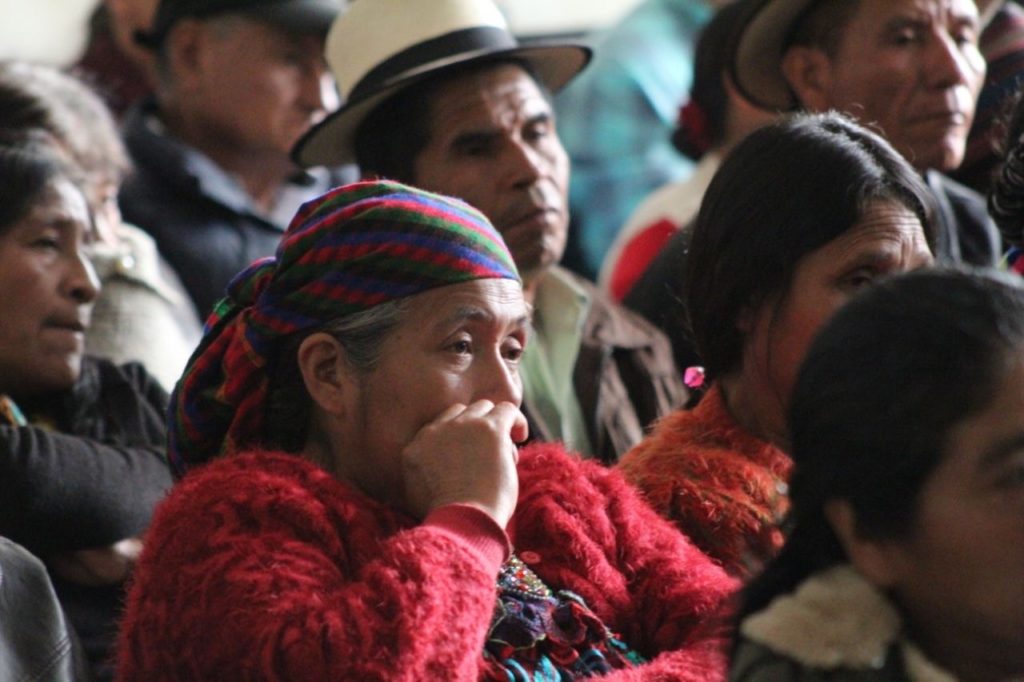On Monday, March 9, the Guatemalan Attorney General’s Office will present its case against three senior military commanders who last November were charged with genocide, crimes against humanity, and forced disappearance against the Maya Ixil population during the government of General Fernando Romeo Lucas García (1978-1982). The 2013 genocide trial, which resulted in a conviction that was later vacated, focused on the army’s actions during the subsequent government of General Efraín Ríos Montt (1982-1983).
The alleged crimes in this case include the massacre deaths of 1,128 people, another 540 selective killings, 81 cases of forced disappearance, and 36 cases of sexual violence against women and girls. The crimes occurred during the Lucas García government, under which prosecutors allege the Guatemalan army first designed and implemented a policy of genocide.
The three officials facing charges are retired General Benedicto Lucas García, former chief of the General Staff of the Guatemalan Army (and the brother of Romeo Lucas García); retired General Manuel Callejas y Callejas, former chief of military intelligence (G2); and retired Colonel César Octavio Noguera Argueta, former chief of military operations (G3).
According to prosecutors, the accused officials are responsible for planning and carrying out the Guatemalan army’s counter-insurgency strategy in the Ixil region, after having determined that the Ixil region was enemy territory. Prosecutors allege that scorched-earth policies resulted in massacres and other grave crimes against the Maya Ixil population and that the army designed the policies eliminate the civilian population. The prosecution evidence includes witness testimony, expert witness testimony, official documents, and forensic evidence.
Guatemalan courts have twice determined that the Guatemalan army carried out a state policy of genocide during the successor government to Lucas García, led by Efraín Ríos Montt. Ríos Montt was convicted of genocide and crimes against humanity against the Maya Ixil in 2013 and sentenced to 80 years. The conviction was later vacated by the Constitutional Court. Ríos Montt died in April 2018 in the midst of his retrial. In a 2018 ruling, a court unanimously found that the Guatemalan army committed genocide against the Maya Ixil population but acquitted the sole defendant in that case of any wrongdoing.
The Association for Justice and Reconciliation (AJR) filed the complaint in this case in 2000. The AJR, which represents 22 Mayan communities in five regions affected by state-sponsored violence during the internal armed conflict, was also a civil party in Ríos Montt genocide case. The Human Rights Office of the Archdioceses of Guatemala (ODHAG) is representing AJR in this case.
Judge Miguel Ángel Gálvez of High Risk Court “B” presides over the pre-trial phase of the case. If he finds sufficient evidence against one or all of the accused, the case will be sent to one of the high-risk tribunals in Guatemala City for a trial before a three-judge panel.
Lucas García and Callejas y Callejas are already serving 58-year sentences for crimes against humanity, aggravated sexual assault, and forced disappearance in the Molina Theissen case. Due to their advanced ages, Lucas García, 87, and Callejas y Callejas, 82, are serving their prison terms in a military hospital. The court granted Noguera Argueta house arrest.
“I Don’t Know Why They Call Me a Genocidaire”
During the first declaration hearings in November 2019, the prosecution read out the names of dozens of victims of selective killings, massacres, sexual violence, and enforced disappearance from different villages in the Ixil region, along with details about the date, place, and circumstances of their deaths. (For a detailed discussion of the specific charges, see Former Guatemalan Army Chief Accused of Genocide, Crimes against Humanity, and Forced Disappearance.)
The defendants proclaimed their innocence. The most outspoken was former Army Chief of Staff and retired brigadier general Benedicto Lucas García.
During the first declaration hearings, Lucas García said that the charges against him were “a total farce.” He fulfilled his duty as commander in chief of the armed forces to prevent a guerrilla takeover, he said. He had protected the indigenous population, he said, claiming any killings were the work of the guerrillas. Lucas García attacked the Catholic Church, accusing it of providing “sanctuary” to guerrillas and said that the forensic evidence presented by the plaintiffs was a “hoax” fabricated to blame him and the army for killings committed by the guerrillas.
“There was no genocide in Guatemala,” Lucas García proclaimed. “I don’t know why they call me a genocidaire, I love the indigenous race.”
Lucas García also faces charges in the CREOMPAZ mass forced disappearance case. The trial has not yet begun because the case has been ensnared in legal challenges for over three years.
Difficult Moments Ahead
Despite an increasingly adverse context for justice in Guatemala, survivors and families of victims remain determined to have their day in court.
AJR president Antonio Caba, himself a survivor of a massacre that took the lives of 95 people in his village of Ilom, in Chajul, told International Justice (IJ) Monitor that the successful prosecution of other emblematic human rights violations, including the Dos Erres massacre, the Spanish Embassy massacre, and the Sepur Zarco sexual violence case, inspired them to pursue justice.
“We recognize that there are difficult moments ahead,” Caba told IJ Monitor. “But we can overcome those difficulties, as we have in the past.”
Jo-Marie Burt is an Associate Professor of Political Science and Latin American Studies at George Mason University. She is also a Senior Fellow at the Washington Office on Latin America (WOLA). Paulo Estrada is a human rights activist, archaeology student at San Carlos University, and civil party in the Military Diary case.

